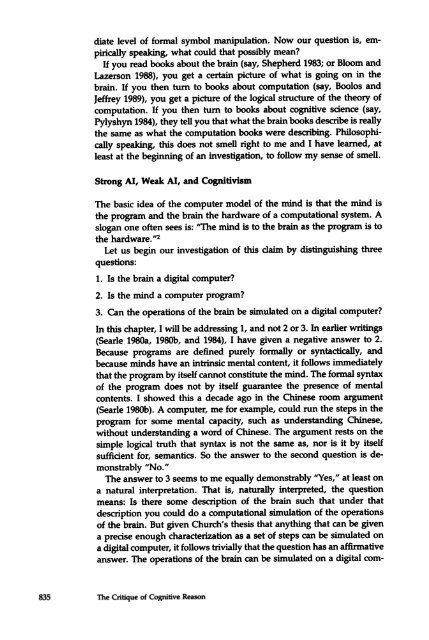John R. Searle - The Critique of Cognitive Reason
John R. Searle - The Critique of Cognitive Reason
John R. Searle - The Critique of Cognitive Reason
You also want an ePaper? Increase the reach of your titles
YUMPU automatically turns print PDFs into web optimized ePapers that Google loves.
diate level <strong>of</strong> formal symbol manipulation . Now our question is , empiricallyspeaking, what could that possibly mean?If you read books about the brain (say, Shepherd 1983 ; or Bloom andLazerson 1988), you get a certain picture <strong>of</strong> what is going on in thebrain . If you then turn to books about computation (say, Boolos andJeffrey 1989 ), you get a picture <strong>of</strong> the logical structure <strong>of</strong> the theory <strong>of</strong>computation . If you then turn to books about cognitive science (say,Pylyshyn 1984 ), they tell you that what the brain books describe is reallythe same as what the computation books were describing . Philosophi -cally speaking, this does not smell right to me and I have learned , atleast at the beginning <strong>of</strong> an investigation , to follow my sense <strong>of</strong> smell.Strong AI , Weak AI , and Cognitivism<strong>The</strong> basic idea <strong>of</strong> the computer model <strong>of</strong> the mind is that the mind isthe program and the brain the hardware <strong>of</strong> a computational system . Aslogan one <strong>of</strong>ten sees is: " <strong>The</strong> mind is to the brain as the program is tothe hardware . " 2Let us begin our investigation <strong>of</strong> this claim by distinguishing threequestions :1. Is the brain a digital computer ?2. Is the mind a computer program ?3. Can the operations <strong>of</strong> the brain be simulated on a digital computer ?In this chapter, I will be addressing 1 , and not 2 or 3. In earlier writings(<strong>Searle</strong> 1980a, 1980b, and 1984), I have given a negative answer to 2.Because programs are defined purely formally or syntactically, andbecause minds have an intrinsic mental content, it follows immediatelythat the program by itself cannot constitute the mind . <strong>The</strong> formal syntax<strong>of</strong> the program does not by itself guarantee the presence <strong>of</strong> mentalcontents . I showed this a decade ago in the Chinese room argument(<strong>Searle</strong> 1980b). A computer , me for example , could run the steps in theprogram for some mental capacity, such as understanding Chinese,without understanding a word <strong>of</strong> Chinese. <strong>The</strong> argument rests on thesimple logical truth that syntax is not the same as , nor is it by itselfsufficient for, semantics. So the answer to the second question is demonstrably" No ."<strong>The</strong> answer to 3 seems to me" equally demonstrably Yes , " at least ona natural interpretation . That is , naturally interpreted , the questionmeans: Is there some description <strong>of</strong> the brain such that under thatdescription you could do a computational simulation <strong>of</strong> the operations<strong>of</strong> the brain . But given Church ' s thesis that anything that can be givena precise enough characterization as a set <strong>of</strong> steps can be simulated ona digital computer , it follows trivially that the question has an affirmativeanswer. <strong>The</strong> operations <strong>of</strong> the brain can be simulated on a digital com -835 <strong>The</strong> <strong>Critique</strong> <strong>of</strong> Co~ tive <strong>Reason</strong>





